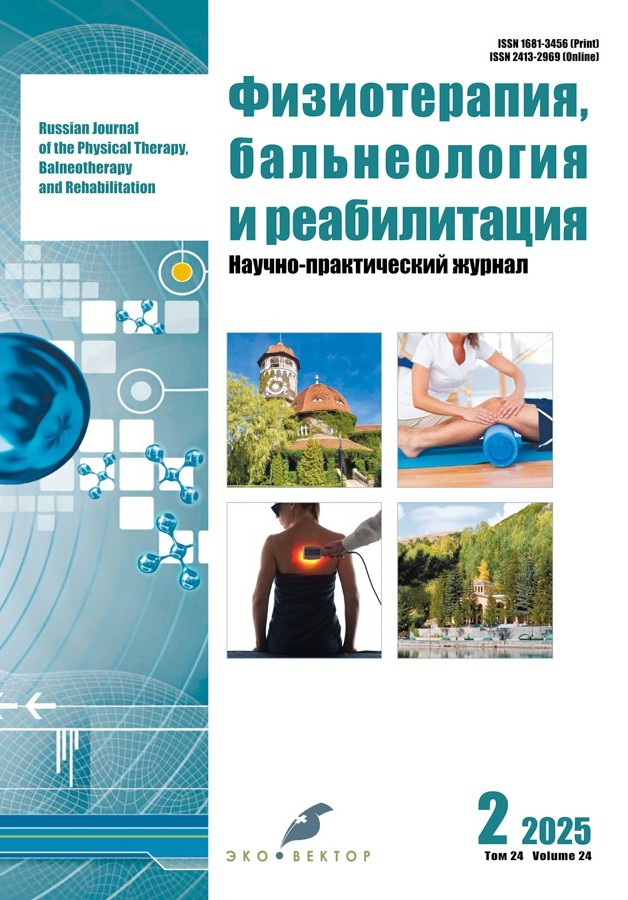双耳节律刺激对代谢综合征患者生理适应反应的形成影响
- 作者: Fedorov S.A.1, Nagornev S.N.2, Frolkov V.K.2
-
隶属关系:
- ACSMA
- Petrovsky National Research Centre of Surgery
- 期: 卷 24, 编号 2 (2025)
- 页面: 107-116
- 栏目: Original studies
- ##submission.datePublished##: 19.05.2025
- URL: https://rjpbr.com/1681-3456/article/view/651503
- DOI: https://doi.org/10.17816/rjpbr651503
- EDN: https://elibrary.ru/HANNVE
- ID: 651503
如何引用文章
详细
论证。代谢综合征的高发性及其对主要人口学指标的负面影响,使得寻找最有效的病理生理矫正方法变得尤为重要。在康复医学技术的应用中,基于物理治疗因子的干预方法具有一定的前景。其中,双耳节律刺激因其能够调节神经体液调节中心的活动,并直接参与营养物质代谢和能量平衡,在科学研究和临床实践中均展现出较大的潜力。
目的。 评估双耳节律刺激在缓解应激反应和调节适应过程中的有效性,以改善代谢综合征患者的病理状态。
材料与方法。采用前瞻性、对照、随机对比研究,共纳入60例确诊代谢综合征的患者,并通过简单固定随机化分为两组。对照组(n=30)接受普通耳机音频刺激。实验组(n=30)接受双耳节律刺激,即左右耳分别接收不同频率的声信号。研究通过以下指标评估双耳节律刺激的疗效:能量稳态的代谢参数(血糖、总胆固醇及其在脂蛋白中的含量);激素水平(胰岛素、皮质醇);心率变异性;氧化应激标志物(丙二醛、Schiff碱、过氧化氢酶、超氧化物歧化酶)。
结果。比较代谢综合征患者与健康对照组的相关参数后,研究确认了该疾病的系统性病理反应,这为采用具有多模式作用机制的治疗方法(如双耳节律刺激)提供了科学依据,并凸显了其临床应用前景。研究发现,双耳节律刺激可增强应激限制机制,在整个治疗过程中逐步加强,并在疗程结束时达到最大效果。生化指标评估结果表明,应激限制机制被显著激活,从而有效降低了应激反应的强度。研究结果表明,动脉粥样硬化指数、血糖水平和基础胰岛素分泌量显著降低,从而导致胰岛素抵抗指数的明显下降。
结论。双耳节律刺激疗法可显著逆转代谢综合征的主要病理生理变化,证实了该技术在代谢障碍患者综合康复中的有效性。双耳节律刺激疗法具有显著的生理适应作用,同时无不良反应,疗效显著,且具有非侵入性和技术实施上的简便性。
全文:
作者简介
Sergey A. Fedorov
ACSMA
Email: fedorov@acsma.ru
ORCID iD: 0000-0003-4920-5982
SPIN 代码: 8105-3619
俄罗斯联邦, Moscow
Sergey N. Nagornev
Petrovsky National Research Centre of Surgery
编辑信件的主要联系方式.
Email: drnag@mail.ru
ORCID iD: 0000-0002-1190-1440
SPIN 代码: 2099-3854
MD, Dr. Sci. (Medicine), Professor
俄罗斯联邦, MoscowValery K. Frolkov
Petrovsky National Research Centre of Surgery
Email: fvk49@mail.ru
ORCID iD: 0000-0002-1277-5183
SPIN 代码: 3183-0883
Dr. Sci. (Biology), Рrofessor
俄罗斯联邦, Moscow参考
- Guidelines for the management of patients with metabolic syndrome. Clinical guidelines. Russian Medical Society for Arterial Hypertension. Moscow; 2013. 43 p. (In Russ.)
- Rus M, Crisan S, Andronie-Cioara FL, et al. Prevalence and risk factors of metabolic syndrome: a prospective study on cardiovascular health. Medicina. 2023;59(10):1711. doi: 10.3390/medicina59101711
- Scuteri A, Laurent S, Cucca F, et al. Metabolic syndrome across Europe: different clusters of risk factors. Eur J Prev Cardiol. 2015;22(4):486–91. doi: 10.1177/2047487314525529
- Oganov RG, Denisov IN, Simanenkov VI, et al. Comorbid pathology in clinical practice. Clinical guidelines. Cardiovascular therapy and prevention. 2017;16(6):5–56. doi: 10.15829/1728-8800-2017-6-5-56 EDN: ZVZZGR
- Chen Y, Wu J, Chen M, et al. Association between metabolic syndrome and outcomes of large-artery atherosclerosis stroke treated with reperfusion therapy. J Stroke Cerebrovasc Dis. 2024;33(11):107927. doi: 10.1016/j.jstrokecerebrovasdis.2024.107927
- Razumov AN, Ponomarenko GN, Sokurov AV, et al. Medical rehabilitation: domestic scientific publication stream. Problems of balneology, physiotherapy, and exercise therapy. 2020;97(4):5–10. doi: 10.17116/kurort2020970415
- Ponomarenko GN. Restorative medicine: fundamental principles and development prospects Physical and rehabilitation medicine. 2022;4(1):8–20. doi: 10.26211/2658-4522-2022-4-1-8-20
- Fedorov SA. Mechanisms of influence of binaural exposure on stress-initiating and stress-limiting systems in patients with metabolic syndrome. In: World science: problems and innovations: Collection of articles of the LXXIV International scientific and practical conference. Penza: MCNS «Science and Education»; 2023. P. 145–148. (In Russ.)
- Bodrova RA, Fedorov SA, Nagornev SN, et al. Efficiency of the binaural effects method in the rehabilitation of patients with post-traumatic stress disorders. Physiotherapist. 2023;6:66–78. doi: 10.33920/med-14-2306-07 EDN: WECITA
- Nagornev SN, Sytnik SI, Bobrovnitsky IP, et al. Pharmacological correction of the lipid peroxidation process during hypoxia and the possibility of increasing human high-altitude resistance using metabolic drugs. Bulletin of the Russian Academy of Medical Sciences. 1996;(7):53–60. (In Russ.)
- Benkov AA, Nagornev SN, Frolkov VK, et al. Effects of a single simultaneous impact of physiotherapeutic factors on stress-realizing and stress-limiting systems of the body. Physiotherapist. 2021;(3):20–28. doi: 10.33920/med-14-2106-03 EDN: HZEYWX
- Rudneva YuD, Lidokhova OV. Components of the stress-realizing and stress-limiting systems of the body. Trends in the Development of Science and Education. 2023;(103-6):35–38. doi: 10.18411/trnio-11-2023-323 EDN: UDWKFO
- Nikolaeva TM, Golubeva EK. The effect of physical activity on heart rate variability during mental activity depending on the reactivity of the parasympathetic division of the autonomic nervous system. Modern issues of biomedicine. 2023;8(2). doi: 10.51871/2588-0500_2023_07_02_17
- Bobrovnitsky IP, Nagornev SN, Razumov AN, Fedorov SA. Application of the audiovisual complex «PRAK» in the rehabilitation of patients with psychosomatic disorders: a methodological guide. Razumov AN, editor. Moscow: Postator; 2024. 76 p. (In Russ.)
- Corona-González CE, Alonso-Valerdi LM, Ibarra-Zarate DI. Personalized theta and beta binaural beats for brain entrainment: an electroencephalographic analysis. Front Psychol. 2021;12:764068. doi: 10.3389/fpsyg.2021.764068
- Gantt MA, Dadds S, Burns DS, et al. The effect of binaural beat technology on the cardiovascular stress response in military service members with postdeployment stress. J Nurs Scholarsh. 2017;49(4):411–420. doi: 10.1111/jnu.12304
- Shamsi F, Azadinia F, Shaygan M. Does brain entrainment using binaural auditory beats affect pain perception in acute and chronic pain?: a systematic review. BMC Complement Med Ther. 2024;24(1):34. doi: 10.1186/s12906-024-04339-y
- Fedorov SA. Mechanisms for the implementation of the sanogenetic potential of binaural beats when they affect patients with metabolic syndrome. In: Modern rehabilitation technologies in science and practice. Collection of articles based on the results of the III Scientific and Practical Symposium. Moscow: Russian Scientific Center of Surgery named after academician B.V. Petrovsky; 2024. P. 17–22. (In Russ.)
- Benkov AA, Nagornev SN, Frolkov VK, et al. Simultaneous application of transcranial magnetic stimulation and low-frequency electrostatic field as treatment of carbohydrate and lipid disorders in patients with metabolic syndrome. Eur J Transl Myol. 2022;32(1):10351. doi: 10.4081/ejtm.2022.10351
- Epifanov VA, Korchazhkina NB. Medical and social rehabilitation of patients with various pathologies: In 2 parts. Part II. Moscow: Limited Liability Company Publishing Group «GEOTAR-Media»; 2019. 560 p. EDN: ULZAFF
- Kotenko KV, Korchazhkina NB, Razinkin SM, et al. Comparative assessment of the state of physical and mental health of athletes and students actively involved in sports. Functional diagnostics. 2011;(3):98–99. EDN: OISIEH
- Korchazhkina NB. The third stage of medical rehabilitation in the conditions of health resort organizations. Further development of health resort treatment after provision of specialized, including high-tech medical care. Resort medicine. 2013;(3):69–72. EDN: SEEPWL
- Mikhailova AA, Kotenko KV, Korchazhkina NB, et al. Database of scientific research on the use of physical factors in surgery. Database registration certificate RU 2021621978, 09/16/2021. Moscow: Russian Scientific Center of Surgery named after Academician B.V. Petrovsky; 2021. (In Russ.) [cited 20 Dec 2024] Available from: https://elibrary.ru/download/elibrary_46602160_48197762.PDF EDN: GBDYHW
补充文件






